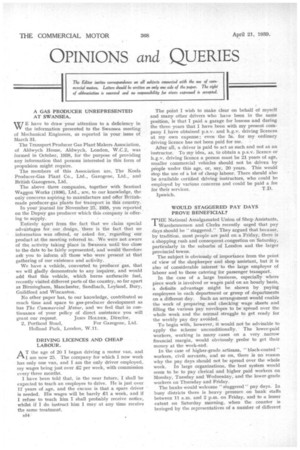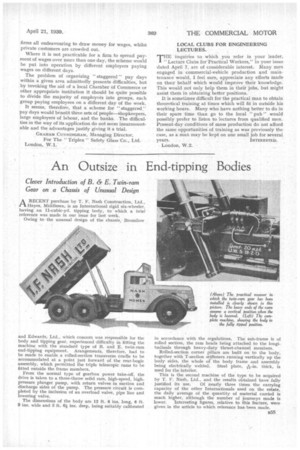OPINIONS and QUERIES
Page 90

Page 91

If you've noticed an error in this article please click here to report it so we can fix it.
A GAS PRODUCER UNREPRESENTED AT SWANSEA.
WE have to draw your attention to a deficiency in the information presented to the Swansea meeting of Mechanical Engineers, as reported in your issue of March 31.
The Transport Producer Gas Plant Makers Association, of Aldwych House, Aldwych, London, W.C,2, was formed in October, 1938, for the purpose of providing any information that persons interested in this form of propulsion might require.
The members of this Association are, The Koela Producer-Gas Plant Co., Ltd., Gazogene, Ltd., and British Gazogenes, Ltd.
The above -three companies, together with Sentinel Waggon Works (1936), Ltd., are, to our knowledge, the only concerns aspiring to manufacture and offer Britishmade producer-gas plants for transport in this country.
In your -journal for November 25; 1938, you reported on the Dupuy gas producer which this company is offering to supply.
Entirely apart from the fact that we claim special advantages for our design, :there is the fact that no information was offered, or asked for, regarding our product at the meeting referred to. We were not aware of the activity taking place in Swansea until too close to the date to be fairly represented, and 'would therefore ask you to inform all those who were present at that gathering of our existence and activity.
We have a vehicle, converted to producer gas, that we will gladly demonstrate to any inquirer, and would add that this vehicle, which burns anthracite fuel, recently visited different parts of the country, so far apart as Birmingham, Manchester, Sandbach, Leyland, Bury, Guildford and Wincanton.
No other paper has, to our knowledge, contributed so much time and space to gas-producer development as has The Commercial Motor, and we feel that in con-. tinuance of your policy of direct assistance you will
grant our request. JOHN HOLDER, Director,
2, Portland Road, For Gazogene, Ltd. Holland Park, London, W.11.
DRIVING LICENCES AND CHEAP LABOUR.
AT the age of 20 I began driving a motor van, and I am now 25. The company for which I now work has only one van, and I am the only driver employed, my wages being just over 22 per week, with commission everythree months.
I have been told that, in the near future, I shall be expected to teach an employee to drive. He is just over 17 years of age, and the excuse is that a spare driver is needed. His wages will be barely 21 a week, and if I refuse to teach him I shall probably receive notice, whilst if I do instruct him I may at any time receive the same treatment.
eS4 The point I wish to make clear on behalf of myself and many other drivers who have been in the same position, is that I paid a garage for lessons and during the three years that I have been with my present company I have obtained p.s.v. and h.g.v. driving licences at my own expense ; even the 5s. for my ordinary driving licence has not been paid forme.
After all, a driver is paid to act as such and not as an instructor. To my idea, as, to obtain a p.s.v. licence or h.g.v. driving licence a person must be 21 years of age, smaller commercial vehicles should not be driven by people under this age, or, say, 20 years. This would stop the use of a lot of cheap labour. There should also be available certified driving instructors, who could be employed by various concerns and could be paid a fee for their services. T.D. Ipswich.
WOULD STAGGERED PAY DAYS PROVE BENEFICIAL?
THE National Amalgamated Union of Shop Assistants, Warehousemen and Clerks recently urged that pay days should be "staggered." They argued that because, by tradition, most people are paid on a Friday, there is a shopping rush and consequent congestion on Saturday, particularly in the suburbs of London and the larger provincial towns.
The subject is obviously of importance from the point of view of the shopkeeper and shop assistant, but it is also of considerable interest • to the large employer of labour and to those catering for passenger transport, In the case of a large business, especially where piece work is involved or wages paid on an hourly basis, a definite advantage might be shown by paying employees in each department or group of departments on a different day. Such an arrangement would enable the work of preparing and checking wage sheets and filling the various pay envelopes to be spread over the whole week and the normal struggle to get ready for the weekly pay day avoided.
To begin with, however, it would not be advisable to apply the scheme unconditionally. The lower-paid workers, working in many cases on a very . narrow financial margin, would obviously prefer to get their money at the week-end.
In the case of higher-grade artisans, " black-coated " workers, civil servants, and so on, there is no reason why the pay days should not be spread over the whole week. In large organizations, the best system would seem to be to pay clerical and higher paid workers on Monday, Tuesday and Wednesday, and the lower-grade workers on Thursday and Friday.
The banks would welcome " staggered " pay days. In busy districts there is heavy pressure on bank staffs between 11 a.m. and 2 p.m. on Friday, and to a lesser extent on Saturday morning, when the counter is besieged by the representatives of a number of different firms all endeavouring to draw money for wages, whilst private customers are crowded out.
Where it is not practicable for a firm to spread payment of wages over more than one day, the scheme would be put into operation by different employers paying wages on different days.
The problem of organizing " staggered " pay days within a given area admittedly presents difficulties, but by invoking the aid of a local Chamber of Commerce or other appropriate institution it should be quite possible to divide the majority of employers into groups, each group paying employees on a different day of the week.
It seems, therefore, that a scheme for "staggered' pay days would benefit thi-ee sets of people—shopkeepers, large employers of labour, and the banks. The difficulties in the way of its application do not seem insurmountable and the advantages justify giving it a trial.
LOCAL CLUBS FOR ENGINEERING LECTURES.
rr HE inquiries to which you refer in your leader,
"Lecture Clubs for Practical Workers," in your issue dated April 7, are of considerable interest. Many men engaged in commercial-vehicle production and maintenance would, I feel sure, appreciate any efforts made on their behalf which would improve their knowledge. This would not only help them in their jobs, but might assist them in obtaining better positions.
It is sometimes difficult for the practical man to obtain theoretical training at times which will fit in outside his working hours. Many who have nothing better to do in their spare time than go to the local " pub " would possibly prefer to listen to lectures from qualified men. Present-day conditions of mass production do not afford the same opportunities of training as was previously the case, as a man may be kept on one small job for several
years. INTERESTED. London, W.2. •






































































































































